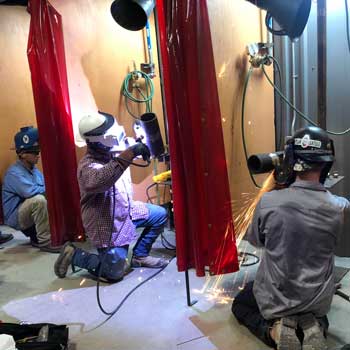Written by: Kelsey Zibell, NCCER Guest Contributor
SHARE THIS
Generally speaking, young professionals pursuing a career in construction learn through an apprenticeship program. These programs accept students who become full-time, paid employees and learn through on-the-job training paired with classroom learning. Apprentices typically spend 80% of their time gaining hands-on experience and 20% of their time in school.
According to the Department of Labor, apprenticeships typically last about four years and workers usually become full employees upon completion of the program.
With benefits like a paycheck, employment, hands-on learning and getting started in your career, apprenticeships are a pretty cool way to gain experience. If we haven’t sold you on it yet, these are the top five perks of becoming an apprentice.

As you complete your apprenticeship, you will spend the majority of your time working in a shop and getting hands-on experience. While the specific experience varies with each craft, you can expect to spend time learning specific skills that you will utilize on a day to day basis in your future career.
While working with your hands is simply more fun than taking notes on a textbook, it is also a better way to develop craft skills. When classroom learning is paired with real-life experiences, an apprentice’s education is being reinforced by practical applications. As they use their hands to learn about their craft and actively practice problem-solving, apprentices learn in the most efficient way possible.
Earn as you learn! As you work through an apprenticeship program, you will earn wages while being taught the core competencies of your future career. As you work on real projects and complete work for a company, you will be rewarded for your efforts and work with a paycheck. Essentially, you are getting paid to get your start in your career – pretty cool, right?
This way, you are getting ahead of the curve. While college students are shelling out money to maybe get a job in their prospective career, apprentices are already making money and establishing themselves in a skilled craft career.
According to a study done by the Wisconsin Department of Public Instruction, apprentices spend less on program costs over five years than college students spend in a single year. By spending less in the beginning stages of your career, you are setting yourself up for a more successful future down the road. Match little to no debt with the opportunity to start making money early, and craft professionals are getting their start well before college students.
Additionally, with a low-risk model like apprenticeships, you are allowing yourself to search for your true passion. Say you start a welding apprenticeship and you find out it just isn’t your thing. Through your hands-on experience and training, you have found that you aren’t crazy about it. No problem!
Without investing thousands of dollars into a single career path, you aren’t locked into any one decision that you make. Go ahead and apply for that plumbing apprenticeship you’ve been looking at. The only way to find your niche and passion is to get out there and try it.
Traditional depictions of college life follow the same narrative – a blossoming social life, beautiful campuses and fun parties. While this may be true for some people, it leaves out a few key details. With college comes, college debt, expensive textbooks, long nights, essays, exams, and a lot more unflattering realities.
By becoming an apprentice instead of pursuing a traditional four-year education, craft professionals are choosing to start having the real fun. While college students read textbooks about what their career may or may not look like, apprentices are working in their field and actively pursuing their goals.
In apprenticeships, students start working on projects and getting an authentic look at what their career is going to be like. By working with your peers to understand and master a new craft, apprentices get to explore their future careers – not just read about them.

When doing an apprenticeship, you are working with skilled craft professionals who have been in the field for a long time. Through working with them and learning from them, you are guaranteed to learn an incredible amount of information from a variety of different craftspeople.
Not only does this ensure that you are learning in the most immersive and detailed way possible, but it gives you a network that you can tap into for the rest of your career. The construction industry is well connected across the country. By having a network of professionals to vouch for you and help you find new opportunities, an apprentice has the flexibility to relocate, travel or grow within their career.
With a growing demand for skills in the construction industry, there’s never been a better time to consider becoming an apprentice.
Whether you’ve already received some training through career & technical education courses or are starting off with no experience, there’s likely a number of apprenticeship programs available near you. Research local construction companies and associations to find out about how to get started with their programs.
